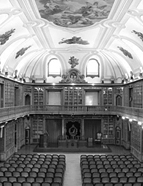

As is well known, the Faculty of Arts of the University of Coimbra, like that of Lisbon, was created in 1911. Among other fields of knowledge, History was also a part of its offering and was included in the institution's 4th Cluster. Its beginnings were necessarily difficult, much like those of the Faculty itself, which did not enjoy its own building until 1914, when the built part was inaugurated. It was assisted by the steady organisational hand of its first director, António de Vasconcelos (1860-1941), who equipped the Faculty with the means for the teaching of the so-called auxiliary History subjects. However, it was easier to immediately find teachers for the subjects that came into force from the then dissolved Faculty of Theology. In fact, the teachers from the latter were placed in the newly created Faculty of Arts on the basis of their skills, as was also the case with the teachers of the Curso Superior de Letras [ former Faculty of Arts] in relation to that of Lisbon.
The appetency of some theologians for History is quite understandable. It was in the Faculdades de Teologia, de Cânones e Leis [Faculties of Theology, Canon Law and Laws], and then in the new Faculty of Law (1836) that History was taught at the University, naturally a history that was pertinent to the theological-legal branches of the sciences taught at the time. By virtue of the 1901 reform, the subjects of Geography, Chronology, Hermeneutics and Exegesis, History (Sacred and) Ecclesiastical, Liturgy and the compulsory attendance of some Law subjects, such as General Sociology and Philosophy of Law or Ecclesiastical Law, and even Anthropology and Geology in the Faculty of Philosophy, enabled the devoted theologians to pursue a career in research and teaching in the field of historical sciences. Along with that of studies in philology and literature, among others, this had been implemented as a result of the marked decadence with which the Faculty of Theology was confronted.
In 1911, both António de Vasconcelos, who taught several subjects at this Faculty, including Isagoge and Archaeology (Biblical Studies), and Joaquim Mendes dos Remédios (1867-1932), were placed in the 2nd Cluster of the Faculty of Arts. Mendes dos Remédios remained in Romance Philology, although he also applied himself to the history of the Jews and New-Christians in Portugal, besides the history of literature, while Vasconcelos, despite his proven track record in language and grammar, settled in the field of History. He had already attained prominence for his published works and for his ability to organise and catalogue the Archive, which were tasks he had officially conducted from 1897 to become its director as soon as it became a department in its own right (1901), a post he retained for over a quarter of a century (1902-1927).
